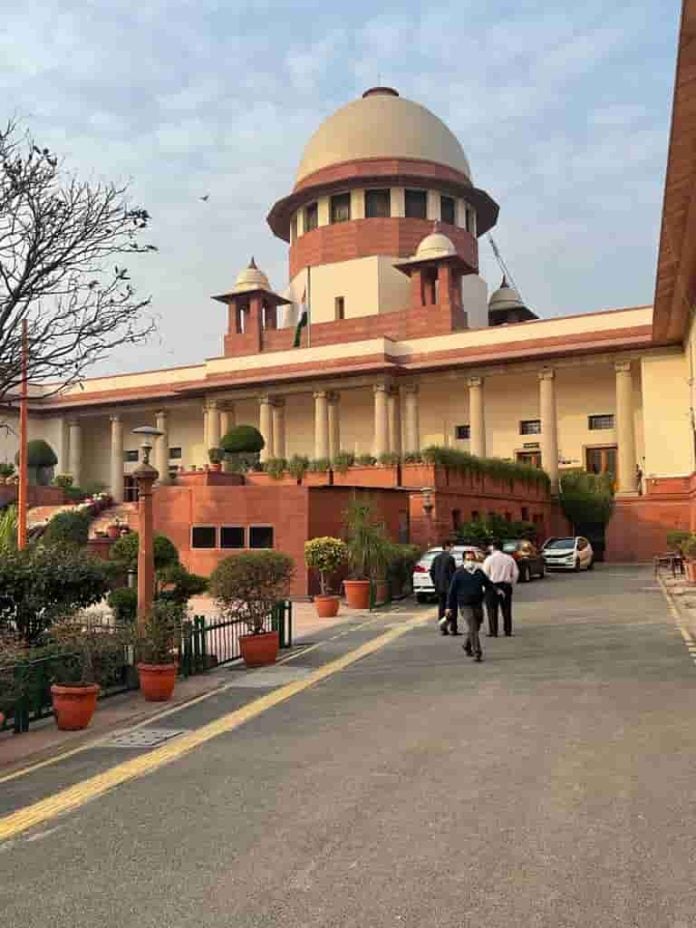The Supreme Court has reiterated that common intention contemplated by Section 34 of the Indian Penal Code pre-supposes prior concert, it requires meeting of minds, and a pre-arranged plan before a man can be convicted for the criminal act of another while acquitting a man convicted and sentenced to life imprisonment under Section 302 read with 34 of the Indian Penal Code.
A two-judge bench of Justices Ajay Rastogi & Abhay S. Oka acquitted a man who has already undergone incarceration for seven years and six months for the offence under Sections 302 and 34 of the IPC. He was sentenced to life imprisonment. The incident is from 1976.
It was the prosecution case that on August 2, 1976, PW1 Khiroda Mohan Paul, Head Master of a High School, and the deceased Purna Chandra Ghosh, assistant teacher in the said school, were returning home at about 5:30PM. Near a railway gate, they noticed that the accused (the appellant, Gadadhar Chandra, and Arjun Mondal, a juvenile) were sitting along with Susanta Kr. Chandra and Rabu. The appellant and the said Arjun caught hold of the bicycle of Ghosh. The appellant questioned the deceased as to why he had assaulted his elder brother. Words were exchanged between the appellant, Arjun and PW1 as well as the deceased. The appellant and Arjun took out knives. When PW1 tried to prevent the assault, the appellant brandished his knife and threatened to assault PW1 if he obstructs. There was a scuffle between Arjun and the deceased. The deceased tried to defend himself by using his bicycle and umbrella. In the scuffle, Arjun stabbed the deceased with his knife. Thereafter, the appellant and Arjun left the place.
The Supreme Court noted in its judgment that when a question was asked to PW1 in the crossexamination that how many blows were exchanged between Gadadhar Chandra (appellant herein) and the deceased. In response, PW1 stated that Arjun administered blows to the deceased, and at that time, Gadadhar Chandra was holding the shirt collar of the deceased. PW1 pleaded ignorance when a suggestion was put to him in cross-examination that Arjun and the appellant also suffered injuries.
Also Read: Supreme Court stays Govt order against Media One, permits Malayalam channel to continue broadcasting
“Apart from PW1, there is no other material witness. The prosecution relied upon the statement of Arjun recorded under Section 164 of CrPC. Even assuming that it is a confessional statement, in view of Section 30 of the Indian Evidence Act, 1872, the same cannot be used against the appellant as Arjun is being separately tried before the Juvenile Justice Board. It is not the prosecution case that the appellant and Arjun were waiting for the deceased near the road by which the deceased used to go back to his village after attending the school”
-the Court noted.
The Supreme Court pointed out that prosecution failed to record statement of Susanta Kr. Chandra and Rabu who were also sitting with the appellant and Arjun on the day of the incident. If, according to the prosecution case, there was a meeting of minds and prior concert between the appellant and Arjun when they were sitting with Susanta Kr. Chandra and Rabu, the prosecution ought to have examined both Susanta Kr. Chandra and Rabu. In fact, they appear to be eyewitnesses to the incident.
The Court said the prosecution has withheld the evidence of two material witnesses who could have thrown light on the incident. Hence, this is a case for drawing an adverse inference against the prosecution. Moreover, the knife allegedly used by the appellant has not been recovered.
Also Read: Supreme Court says not paying rent not a penal offence, quashes FIR
The Court observed,
“As consistently held by this Court, common intention contemplated by Section 34 of IPC presupposes prior concert. It requires meeting of minds. It requires a prearranged plan before a man can be vicariously convicted for the criminal act of another. The criminal act must have been done in furtherance of the common intention of all the accused. In a given case, the plan can be formed suddenly. In the present case, the nonexamination of two crucial eye witnesses makes the prosecution case about the existence of a prior concert and prearranged plan extremely doubtful.”
On the basis of the above observation, the Apex Court has held that the prosecution has failed to prove ingredients of Section 34 of IPC in this case. The appellant has been implicated only with the aid of Section 34. Therefore, the appeal must succeed.
“Accordingly, the impugned judgments and orders dated 23rd December 2008 and 5th June 1990 of the High Court and Sessions Court are hereby set aside. The appellant is acquitted of the charges against him”
-said the Court in its order.
Also Read: Amazon, Future apprise Supreme Court about failure of attempts to negotiate on dispute
8776-2009-13-1501-34155-Judgement-15-Mar-2022

